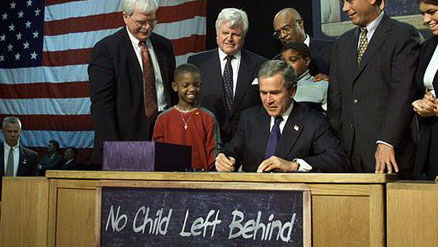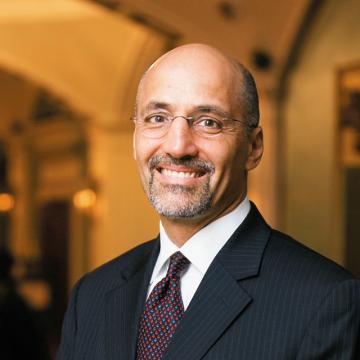From the Director: History lessons for an unprecedented president
Mark Twain is reported to have said that history doesn’t repeat itself, but it does rhyme.
For the Miller Center, a research center that studies the presidency, the Trump administration could be the best of times for presidential rhyming.
Donald Trump’s presidency is premised on being unprecedented, on smashing conventions. Trump seems eager to break gridlock, defy history, and embrace spontaneity and originality. Many Americans voted for him for that reason. At least as many Americans fear his no-holds-barred approach.
A Trump administration would do well to pay attention to where history might rhyme. That is, there may be patterns in presidential history that will contain, constrain, or even comfort a predictably unpredictable president. The Miller Center sees its role as providing nonpartisan advice to a new president on where the lessons of history, firsthand experience, and expertise can lead to outcomes that benefit all Americans.
Moving from the outside to the inside. Donald Trump will be an outsider president whose party controls both houses of Congress. That raises expectations. Possible first year initiatives include tax reform, infrastructure, trade, energy, immigration, and health care.
Similarly, three recent outsider presidents controlled both houses of Congress. Jimmy Carter, Bill Clinton, and Barack Obama all rode into office on a wave of optimism about their potential to shake up Washington. All picked issues similar to Trump’s. Each struggled to move an agenda with Congress.

Carter most famously captured this in his own Miller Center Presidential Oral History Program interview:
Very few of the members of Congress, or members of the major lobbying groups, or the distinguished former Democratic leaders, had played much of a role in my election. There wasn’t that tie of campaign interrelationship that ordinarily would have occurred had I not been able to win the nomination by myself. I just didn’t have that sort of potential tie to them, and I think they felt that they were kind of on the outside.
George W. Bush also had big reform plans. Josh Bolten—Bush’s final chief of staff and a policy aide for nearly ten years—recently told the Miller Center that Bush came into office with a clear policy agenda. But as the son of a president, he was no outsider and enjoyed working closely with Congress. First, he passed tax reform. Next, he reached across party lines early, working with Democrats such as George Miller and Ted Kennedy to pass No Child Left Behind. Bolten sees, in particular, a big opportunity for the Trump administration to pursue tax reform in a way that defies ideological convention.

Claiming a mandate. Like two recent predecessors, Trump enters office with questions about his mandate—trailing Hillary Clinton by nearly three million popular votes. Neither Bill Clinton nor George W. Bush won a majority of the electorate either. Each president struggled in his first year to solidify his legitimacy. Yet both also achieved major successes, especially when they reached across party lines and enacted major agenda items such as NAFTA and No Child Left Behind.
Whether Trump will do that remains to be seen, of course, because the president-elect also seems to relish conflict and controversy. As Chris Lu, who oversaw Obama’s transition, said: “This appears to be a president-elect who wants to tear the playbook up.” And even for the most popular new president, long-term success is not guaranteed. As Lu described it: “When presidents have governing majorities, they think those majorities will last forever.” History teaches that the pendulum is always ready to swing back.
Building a team. Trump has nominated a combination of business leaders, governors, and former military and civilian officials to his cabinet. Some have received widespread praise, others blistering criticism. History shows both successes and failures for the kinds of experience these individuals bring to public service.
Congress can and will spend considerable time on appointments. Dan Meyer, a legislative affairs director for George W. Bush, neatly summarized the challenge. “Floor time in the U.S. Senate is a scarce resource. There are the things you want to do. There are also the things you have to do, like passing spending bills. And then there are nominations.”
Even after the inevitable and time-consuming confirmation battles to come, White House alumni across administrations all say that teamwork is critical. The White House team can help steer the cabinet but also must empower it to work on behalf of the president. Here, the Trump transition seems a bit behind where the Bush team was in 2001. As Bolten recounted, “We were blessed to have a campaign staff that was itself ready to move into governance. My concern for the current transition is thatthere is . . . not a thick policy agenda with detail to it . . . and there’s also not the big infrastructure of people to come in.”

Defending the nation. Getting the team on one playbook is particularly important for the most sacred duty of any administration—protecting the American people. As the Miller Center’s Eric Edelman—a former national security advisor to Vice President Dick Cheney—has said, it’s not whether the president will face a crisis; it is how many crises, and how he responds to his first failure.
Each new president wants to steer foreign and defense policy toward new priorities. Yet each discovers that the diplomatic corps, the armed services, and the various intelligence agencies have their own long-standing priorities and grievances. Moreover, Congress also will want some say in the matter, particularly with respect to defense and intelligence spending.
So while Trump will be the commander in chief, he will soon discover what John Kennedy said after his first year:
I would say that the problems are more difficult, the responsibilities on the United States are greater than I imagined them to be, and the limitations on our ability to bring about a favorable result are greater than I imagined them to be.
In that sense, the brewing fight between the president-elect and the CIA, the breaches of diplomatic protocols, and the roiling questions about conflicts of interest—whether or not they are well-chosen fights—suggest that this administration may care less about institutional practices. But that will make getting Washington to move far more difficult than the new team believes. If the past is any indication, Washington will work without fear or favor, regardless of who sits at 1600 Pennsylvania Avenue.
Our role. A Trump administration presents challenges for an organization like ours as we seek to be a constructive and useful resource. Some of those challenges come from the new president himself. As our Governing Council member Ann Compton termed it, this president-elect “shoots from the lip.” Or, as one former Republican White House chief of staff said, he pushes the boundaries intentionally and “doesn’t taste his words before speaking them.” So for an organization steeped in the idea that rigorous study should guide contemporary practice, we may not have an interested customer.
That said, our wider target audience is likely to be White House staff, senior cabinet officials, and an educated and experienced Washington establishment. The first two groups are still forming, but it is at those inflection points—where the new administration meets the Washington establishment—that we have the greatest opportunity to advance the conversation. There appear to be many excellent people in the mix. There also appears to be an evolution of who is doing what. We hope and expect that will sort itself out by Inauguration Day.
In many ways, the Miller Center has been preparing for this moment for four decades—building a repository of presidential lessons learned and a network of practitioners. We will do our best to make sure our wealth of presidential expertise and experience can be a treasure trove for the new team.
